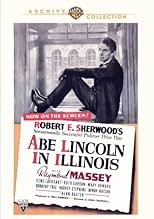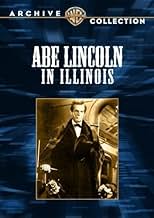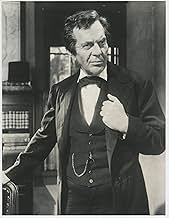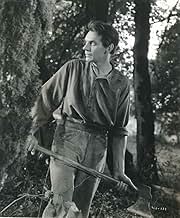IMDb-BEWERTUNG
7,3/10
2197
IHRE BEWERTUNG
Füge eine Handlung in deiner Sprache hinzuHumble Abraham Lincoln gains the respect of his Illinois neighbors, growing in stature and respect until he is elected President in 1860 and departs for Washington.Humble Abraham Lincoln gains the respect of his Illinois neighbors, growing in stature and respect until he is elected President in 1860 and departs for Washington.Humble Abraham Lincoln gains the respect of his Illinois neighbors, growing in stature and respect until he is elected President in 1860 and departs for Washington.
- Für 2 Oscars nominiert
- 2 Gewinne & 2 Nominierungen insgesamt
Howard Da Silva
- Jack Armstrong
- (as Howard da Silva)
Empfohlene Bewertungen
I absolutely loved this movie! maybe it is because I am a history buff but I thought it was wonderful!. I am currently doing a project on Abraham Lincoln where my friends and I on working on a student directed film about Abraham Lincoln and you can not imagine how much this movie has helped me. This movie tells the tale of one of the greatest man in history and how he evolved along the way to become even greater. I can only hope that this movie will help someone see the wonders of his life as it helped me and as Honest Abe helped so many other people. I loved it when they showed his debate with Stephen Douglas. That was really the highlight of the movie because it showed him giving his real opinion and it caught my attention. His speech was amazing!! 10 thumbs up!!!! :D
Besides Raymond Massey, a whole flock of actors have been known for playing America's sixteenth president, Henry Fonda, Walter Huston, Sam Waterston, Hal Holbrook, Dennis Weaver, Gregory Peck, John Carradine. Character actor Frank McGlyn practically made a career of playing The Great Emancipator whenever Honest Abe was a character in a film. But the standard has been set by Raymond Massey who did Lincoln in Robert Sherwood's play for 472 performances on Broadway during the 1938-1939 season and he repeats the title role in Abe Lincoln in Illinois for this film version.
I've no doubt that Sherwood used as source material for his play a lot of information based on Carl Sandburg's biography, Lincoln the Prarie Years. At that time Sandburg was considered the unofficial custodian of the Lincoln legend and mythology. Of course he based a lot of his work on the biography of Lincoln written by his law partner William Herndon played here by Alan Baxter. Herndon's well known antipathy for Mary Todd Lincoln as the shrewish wife of his good friend comes through her in Ruth Gordon's portrayal. It should be said that Mary Lincoln regarded Herndon as an opportunist drunk and he certainly did have a substance abuse problem.
Gene Lockhart as Lincoln's rival Stephen A. Douglas is well done also, though Lockhart was a bit tall for the part. Had Douglas ever been elected president he would have been our shortest president, he was barely over five feet tall. The rivalry between these two was kind of like the Yankees and Red Sox with the Yankees always coming out on top until recent years. Lincoln is still our tallest president at 6'4" so the contrast on the speaking platform at the Lincoln-Douglas debates was really something to see.
The only other actor to recreate his stage role besides Massey was Howard DaSilva who played Jack Armstrong. Not the All American hero, but the leader of the local gang of roughnecks who Lincoln beat in a wrestling match and who becomes his lifelong friend. All part of the Lincoln legend carefully preserved by Sandburg and Sherwood. It was one of DaSilva's earliest screen roles.
Raymond Massey got an Academy Award nomination for Best Actor in 1940 and he was up against a strong field that included Henry Fonda for The Grapes of Wrath, Charles Chaplin for The Great Dictator, and Laurence Olivier in Rebecca. The winner however was a long-shot, James Stewart for The Philadelphia Story. There was a lot of sentiment that year that Stewart should have received the Oscar the year before for Mr. Smith Goes to Washington. So the good Academy voters made up for it this year. It goes that way with Oscar every so often.
Abe Lincoln in Illinois still holds up very well although today's historical Lincoln specialists might have different interpretations placed on some of the events you see.
I've no doubt that Sherwood used as source material for his play a lot of information based on Carl Sandburg's biography, Lincoln the Prarie Years. At that time Sandburg was considered the unofficial custodian of the Lincoln legend and mythology. Of course he based a lot of his work on the biography of Lincoln written by his law partner William Herndon played here by Alan Baxter. Herndon's well known antipathy for Mary Todd Lincoln as the shrewish wife of his good friend comes through her in Ruth Gordon's portrayal. It should be said that Mary Lincoln regarded Herndon as an opportunist drunk and he certainly did have a substance abuse problem.
Gene Lockhart as Lincoln's rival Stephen A. Douglas is well done also, though Lockhart was a bit tall for the part. Had Douglas ever been elected president he would have been our shortest president, he was barely over five feet tall. The rivalry between these two was kind of like the Yankees and Red Sox with the Yankees always coming out on top until recent years. Lincoln is still our tallest president at 6'4" so the contrast on the speaking platform at the Lincoln-Douglas debates was really something to see.
The only other actor to recreate his stage role besides Massey was Howard DaSilva who played Jack Armstrong. Not the All American hero, but the leader of the local gang of roughnecks who Lincoln beat in a wrestling match and who becomes his lifelong friend. All part of the Lincoln legend carefully preserved by Sandburg and Sherwood. It was one of DaSilva's earliest screen roles.
Raymond Massey got an Academy Award nomination for Best Actor in 1940 and he was up against a strong field that included Henry Fonda for The Grapes of Wrath, Charles Chaplin for The Great Dictator, and Laurence Olivier in Rebecca. The winner however was a long-shot, James Stewart for The Philadelphia Story. There was a lot of sentiment that year that Stewart should have received the Oscar the year before for Mr. Smith Goes to Washington. So the good Academy voters made up for it this year. It goes that way with Oscar every so often.
Abe Lincoln in Illinois still holds up very well although today's historical Lincoln specialists might have different interpretations placed on some of the events you see.
10lugonian
ABE LINCOLN IN ILLINOIS (RKO Radio, 1940), directed by John Cromwell, is not so much a biography of Abraham Lincoln, but the life Lincoln lived from his early years to a position that would lead him to politics, and against all odds, his winning the election for the United States presidency in 1860. Based on the Pulitzer Prize winning 1938 play by Robert E. Sherwood, the screen adaptation, tracing Lincoln's thirty years starting in 1831 to his train ride leading to Washington, D.C., in 1861, stars Raymond Massey in a role he originated on stage, being the best performance of a great American ever enacted by an actor who wasn't. Massey, a Canadian by birth, is not only the perfect candidate for the title role, but an ideal choice. Massey's believability in his role earned him an Academy Award nomination as Best Actor. Although he didn't win the election for that year, it is Massey who very well holds this movie together.
A follow-up of sorts to John Ford's most recent YOUNG MR. LINCOLN (20th Century-Fox, 1939), starring Henry Fonda, focusing on Lincoln's early years as a young lawyer in Springfield, Ill., and a retelling in parts to D.W. Griffith's ABRAHAM LINCOLN (United Artists, 1930), starring Walter Huston, ABE LINCOLN IN ILLINOIS starts off on a rainy afternoon in 1831 with an introduction to the character of Abraham Lincoln (Raymond Massey), age 22, sitting on the floor in a log cabin reading a book by Shakespeare, accompanied by his father (Charles B. Middleton) and a stepmother (Elisabeth Risdon). With the Lincoln family background briefly depicted, the next scene follows Abe, who had left home to accept a $30 a month job as part of the crew rowing a flatboat hauling hogs down the Sangamon River to New Orleans. Along the way he encounters a very beautiful girl named Ann Rutledge (Mary Howard), with whom he decides to settle down in her native town of New Salem where he becomes in charge of a general store, a position offered him by his employer, Denton Offut (Harlan Briggs). When he finds Jack Armstrong (Howard Da Silva), the greatest fighter who cannot be beat, a little drunk and annoying Ann, who, along with his other friends, having invaded her tavern, Abe, a stranger in town, comes to the young lady's defense and publicly wrestles Jack to the end, defeating his advisory and winning the admiration from all, especially the respect and loyal-ship of Jack Armstrong. The year 1832 profiles Lincoln acting as leader in command of his soldiers, with Armstrong being among them, during the Blackhawk War period; 1835 now finds Lincoln in a new position as postmaster general. He is visited by Joshua Speed (Minor Watson) and Ninian Edwards (Harvey Stephens) who introduce Abe to politics by choosing him to serve in the legislature, which he would serve four terms. As for Ann, having been engaged to John McNeil (Maurice Murphy), now living in New York for two years, finds that after receiving a letter from him that he has no intentions of returning to her. To stop gossip from circulating around Ann's good name, Abe admits his love for her from the moment he first saw her, and asks her to become his steady. The relationship between them is cut short when she is stricken with an illness and dies. Lincoln quits the legislation to work in the law office with John Stuart in Springfield, forming a partnership of Stuart & Lincoln, Counselors-at-Law. Slowly improving his social position, Lincoln is introduced to Mary Todd (Ruth Gordon) at a function given by her sister and Ninian's wife, Elizabeth Edwards (Dorothy Tree). Elizabeth wants Mary to marry an aristocrat, someone like Stephen A. Douglas (Gene Lockhart), but her interest rests on Mr. Lincoln, whom she eventually marries on November 4, 1842. The marriage produces four sons (the movie indicates three, eliminating one who died in his fourth year), and shows Mary's fight in having her hayseed husband fulfill his destiny, to become president of the United States.
Ruth Gordon (1896-1985), a prominent stage actress and playwright, in her movie debut, gives a remarkable performance in one of the best carnations of Mary Todd Lincoln ever portrayed on screen. Gene Lockhart (1892-1957), a veteran character actor in many feature film roles, goes unnoticed as a very satisfying Stephen A. Douglas (1813-1861). Lockhart's best moment finds his Stephen Douglas sincerely congratulating his opponent Abraham Lincoln in winning the U.S. election, something that should become a prime example with modern-day candidates.
As mentioned before, ABE LINCOLN IN ILLINOIS is very much a retread to D.W. Griffith's 1930 presentation of ABRAHAM LINCOLN, with differences being the elimination of Lincoln's birth, his trying years in the White House during the Civil War and assassination in April 1865. In many ways, ABE LINCOLN IN ILLINOIS is an excellent movie with excellent portrayals. Being a screen adaptation to a stage play, John Cromwell's direction, makes no indication as such. Minus Technicolor, it's full of outdoor scenery and historical detail ranging from costumes to reproductions of small towns. Highlights include the well staged Lincoln-Douglas debate, and one where Lincoln finally losing his temper towards his wife, Mary, after embarrassing him in front of his committee, by ordering her, twice, "You're not/never to do that again!"
ABE LINCOLN IN ILLINOIS, formerly shown on commercial television annually either on or around Lincoln's birthday, February 12, later presented on video cassette finally on cable television's American Movie Classics prior to 2000, and Turner Classic Movies. Quite enjoyable as a motion picture, and quite informative on a historical point of view, this production, at 110 minutes, succeeds on both counts. "Glory, Glory Hallelujah, his truth is marching on." (****)
A follow-up of sorts to John Ford's most recent YOUNG MR. LINCOLN (20th Century-Fox, 1939), starring Henry Fonda, focusing on Lincoln's early years as a young lawyer in Springfield, Ill., and a retelling in parts to D.W. Griffith's ABRAHAM LINCOLN (United Artists, 1930), starring Walter Huston, ABE LINCOLN IN ILLINOIS starts off on a rainy afternoon in 1831 with an introduction to the character of Abraham Lincoln (Raymond Massey), age 22, sitting on the floor in a log cabin reading a book by Shakespeare, accompanied by his father (Charles B. Middleton) and a stepmother (Elisabeth Risdon). With the Lincoln family background briefly depicted, the next scene follows Abe, who had left home to accept a $30 a month job as part of the crew rowing a flatboat hauling hogs down the Sangamon River to New Orleans. Along the way he encounters a very beautiful girl named Ann Rutledge (Mary Howard), with whom he decides to settle down in her native town of New Salem where he becomes in charge of a general store, a position offered him by his employer, Denton Offut (Harlan Briggs). When he finds Jack Armstrong (Howard Da Silva), the greatest fighter who cannot be beat, a little drunk and annoying Ann, who, along with his other friends, having invaded her tavern, Abe, a stranger in town, comes to the young lady's defense and publicly wrestles Jack to the end, defeating his advisory and winning the admiration from all, especially the respect and loyal-ship of Jack Armstrong. The year 1832 profiles Lincoln acting as leader in command of his soldiers, with Armstrong being among them, during the Blackhawk War period; 1835 now finds Lincoln in a new position as postmaster general. He is visited by Joshua Speed (Minor Watson) and Ninian Edwards (Harvey Stephens) who introduce Abe to politics by choosing him to serve in the legislature, which he would serve four terms. As for Ann, having been engaged to John McNeil (Maurice Murphy), now living in New York for two years, finds that after receiving a letter from him that he has no intentions of returning to her. To stop gossip from circulating around Ann's good name, Abe admits his love for her from the moment he first saw her, and asks her to become his steady. The relationship between them is cut short when she is stricken with an illness and dies. Lincoln quits the legislation to work in the law office with John Stuart in Springfield, forming a partnership of Stuart & Lincoln, Counselors-at-Law. Slowly improving his social position, Lincoln is introduced to Mary Todd (Ruth Gordon) at a function given by her sister and Ninian's wife, Elizabeth Edwards (Dorothy Tree). Elizabeth wants Mary to marry an aristocrat, someone like Stephen A. Douglas (Gene Lockhart), but her interest rests on Mr. Lincoln, whom she eventually marries on November 4, 1842. The marriage produces four sons (the movie indicates three, eliminating one who died in his fourth year), and shows Mary's fight in having her hayseed husband fulfill his destiny, to become president of the United States.
Ruth Gordon (1896-1985), a prominent stage actress and playwright, in her movie debut, gives a remarkable performance in one of the best carnations of Mary Todd Lincoln ever portrayed on screen. Gene Lockhart (1892-1957), a veteran character actor in many feature film roles, goes unnoticed as a very satisfying Stephen A. Douglas (1813-1861). Lockhart's best moment finds his Stephen Douglas sincerely congratulating his opponent Abraham Lincoln in winning the U.S. election, something that should become a prime example with modern-day candidates.
As mentioned before, ABE LINCOLN IN ILLINOIS is very much a retread to D.W. Griffith's 1930 presentation of ABRAHAM LINCOLN, with differences being the elimination of Lincoln's birth, his trying years in the White House during the Civil War and assassination in April 1865. In many ways, ABE LINCOLN IN ILLINOIS is an excellent movie with excellent portrayals. Being a screen adaptation to a stage play, John Cromwell's direction, makes no indication as such. Minus Technicolor, it's full of outdoor scenery and historical detail ranging from costumes to reproductions of small towns. Highlights include the well staged Lincoln-Douglas debate, and one where Lincoln finally losing his temper towards his wife, Mary, after embarrassing him in front of his committee, by ordering her, twice, "You're not/never to do that again!"
ABE LINCOLN IN ILLINOIS, formerly shown on commercial television annually either on or around Lincoln's birthday, February 12, later presented on video cassette finally on cable television's American Movie Classics prior to 2000, and Turner Classic Movies. Quite enjoyable as a motion picture, and quite informative on a historical point of view, this production, at 110 minutes, succeeds on both counts. "Glory, Glory Hallelujah, his truth is marching on." (****)
Episodic recounting of Lincoln's life up to the Presidency. Written by Robert Sherwood, one of FDR's speechwriters. Good performances by Ruth Gordon, Alan Baxter, Howard DaSilva, Clem Bevans.
Massey is the definitive movie Lincoln. Excellent work, emotional range and depth. Much better than Henry Fonda, whose Lincoln was apparently in some kind of trance.
May seem a little dated to modern audiences; occasionally strives for emotional poignancy that now comes across as somewhat corny.
Lots of little details, good depictions of frontier life, political campaigns in the 1800's. Includes two of Lincoln's best speeches from that period, with Massey's performance very close to Lincoln's 19th century oratorical style.
Highly recommended to students of American history and fans of old movies.
Massey is the definitive movie Lincoln. Excellent work, emotional range and depth. Much better than Henry Fonda, whose Lincoln was apparently in some kind of trance.
May seem a little dated to modern audiences; occasionally strives for emotional poignancy that now comes across as somewhat corny.
Lots of little details, good depictions of frontier life, political campaigns in the 1800's. Includes two of Lincoln's best speeches from that period, with Massey's performance very close to Lincoln's 19th century oratorical style.
Highly recommended to students of American history and fans of old movies.
With all due respect to Henry Fonda, Walter Huston, and a myriad of other cinematic Lincolns, Raymond Massey is the Abe to end all Abes. His moving and mesmerizing performance gives us the real Mr. Lincoln in all his complexity. Alongside the warmth, compassion and humor for which we love and revere Mr. Lincoln, we see in Massey the dark side as well: the doubts, fears, indecision and deep melancholia with which Abraham Lincoln struggled his whole life, and which clashed with his fierce ambition. Ruth Gordon is superb as Lincoln's equally ambitious wife, Mary Todd Lincoln. No hagiography, this movie lets us see the Lincolns as human beings with real "issues", rather than mere heroes of history.
Besides all this, we have Massey's astonishing physical resemblance to Lincoln.
What's most amazing is that the spirit of this most quintessentially American of our American heroes should be so wonderfully captured and portrayed by.... a Canadian!
Besides all this, we have Massey's astonishing physical resemblance to Lincoln.
What's most amazing is that the spirit of this most quintessentially American of our American heroes should be so wonderfully captured and portrayed by.... a Canadian!
Wusstest du schon
- WissenswertesAfter his success playing Lincoln in the film and on Broadway, Raymond Massey began to assume the character in real life. He often appeared at social gatherings dressed in Lincoln-esque attire, assuming a Lincoln-like manner and speech. His friend, the playwright George S. Kaufman, observed, "Massey won't be satisfied until someone assassinates him."
- PatzerWhen results for the 1860 election are being received, West Virginia is listed on the the state-by-state tally board. West Virginia didn't become a state until 1863, when it broke off from Virginia after that state had seceded from the Union.
- Zitate
Mentor Graham: Well, Abe, there are always two occupations open to those who have failed at everything else: school teaching and politics.
- VerbindungenFeatured in History Brought to Life (1950)
- SoundtracksOld Abe Lincoln Came Out of the Wilderness
(uncredited)
Traditional
Sung by chorus over opening credits
Top-Auswahl
Melde dich zum Bewerten an und greife auf die Watchlist für personalisierte Empfehlungen zu.
- How long is Abe Lincoln in Illinois?Powered by Alexa
Details
Box Office
- Bruttoertrag in den USA und Kanada
- 1.451.880 $
- Laufzeit1 Stunde 50 Minuten
- Farbe
- Seitenverhältnis
- 1.37 : 1
Zu dieser Seite beitragen
Bearbeitung vorschlagen oder fehlenden Inhalt hinzufügen

Oberste Lücke
By what name was Abe Lincoln in Illinois (1940) officially released in India in English?
Antwort





































